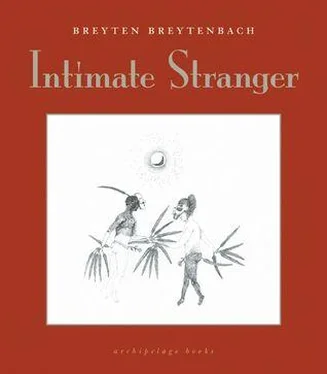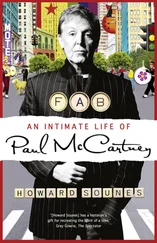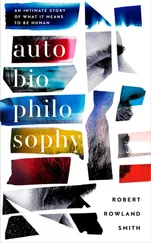What is it we are imagining? Picaro asks. The ‘real’? Can it be argued that imagination recognizes the real and does so by imitating it? In order to imitate you have to recognize the other as an agent; more precisely, you have to recognize that the other incarnates a goal. What’s the difference between pretending (to understand) and imitating recognition? It is believed that non-human primates do not have the capacity for monitoring shared attention, and thus they cannot teach one another. How do they learn then? By mere aping? What is it that they imitate if not the gestures and actions that would ensure survival, like putting on hats and veils? But then, Picaro says, he has read that the mating dance among chimpanzees and baboons may be far more intricate than among humans — that with chimps, for example, the loud sounds made during sex will reflect careful and sophisticated social calculation. It is believed (but how can we ever know ?) that the female tries to blur paternity by mating with as many individuals as possible when her sexual swellings show that she’s ready to conceive, because the males are prone to kill any infant they believe not to be theirs. By shouting (being “acoustically exuberant”) while getting fucked the female attracts and excites and recruits other partners, hoping to thus gain many influential protectors for her future offspring. But when a higher-ranking female is present she will be as quiet as a mouse, even while she’s being had, so as not to incite the obstructiveness of her elders. One has to feed. “Copulation calls are not a feature of public life in Western societies, but the situation could be different in hunter-gatherer groups, which enjoy little privacy.” (Nicholas Wade, The New York Times )
By imitating the form of writing we try to apprehend contents, Picaro postulates.
So as to survive we mime the stories of ourselves. We are apes imagining ourselves to be human and hairless the better to invent selves. Hence the importance of veils and hats.
The dust of this body of mine is the Veil face of the soul, Behind the Veil they treat me as men treat parrots,
Hafiz
But (Picaro warns) we should not mistake this imitation/ apprehension of the ‘real’ as the incarnation of ‘truth.’ It may well be but a projection of one possibility among others. Kundera tells us that Kafka’s writing “represents one fundamental possibility of man and his world, a possibility that is not historically determined and that accompanies man more or less eternally.”
Ethics come into play in the implications of what we imagine. On a very basic level, evidently, Picaro holds, we may argue that we recognize the ethical approach in writing by what it is not , what it does not transport or relish in: racism, gratuitous cruelty, deliberate misrepresentation, ‘inventing’ facts, old women giving blowjobs to young medical students in Paris. . But can it not be reasoned that this is censorship underestimating the reader’s capacity for making her own judgments and drawing her own inferences? Transportation is, after all, not the same as promotion. Or is it? Codes of behaviour may be as important in real societies as they are in imaginary ones. Drawers are useful.
Responsibility — to both material and reader — lies in the choices we make, according to Picaro: ordering (sequencing), which implies a hierarchy of attention if not importance, and is played out in structuring and elimination and highlighting. Can all information conceivably have equal value and importance? Will the consciousness be able to access information unless it is given the ‘texture’ of inequality in presentation and treatment, of degrees of resonance and implication? And can we therefore say, he speculates, that there may be opposition between doing away with ignorance (by putting everything out there, however horrible or despicable, going to the limits of the conceivable, and beyond) and compassion (trying to help bring about a modicum of liveable conditions by, for instance, limiting cruelty and greed)?
Or is this not a concern of writing? Picaro would like to imagine himself a hedonist. Are we not here to entertain and divert? Perhaps to edify, but moderately? (“Small fish ought to be fried lightly.” [Laotse]) And is oblivion not as important to human congress as anything else? Writing may be about re-membering but it is also about for-getting. Why should we know that which we can do nothing about? In the world that we inhabit there’s “the progressive concentration of power, tending to deify itself; the bureaucratization of social activity that turns all institutions into boundless labyrinths; and the resulting depersonalization of the individual.” (Kundera)
Picaro, if you paid attention, dear Reader, wrote about this extensively in previous chapters. He now repeats: “We need to remember that we’re bastards and forget that we’re obedient citizens.”
“The ideal of truth inherent in its entirely unpretentious objectivity, at least over long passages, proves itself the only legitimate reason for continuing to produce liter-ature in the face of total destruction. Conversely, the construction of aesthetic or pseudo-aesthetic effects from the ruins of an annihilated world is a process depriving literature of its right to exist.”
On the Natural History of Destruction , W. G. Sebald
But we write a life, Picaro argues. Living (mostly unconsciously) and writing (often wittingly) are processes of finding and according a fullness to life and attempts to sidestep death for as long as possible. “ Once more he found himself in the presence/ of mystery. Rain. Laughter. History. Art. The hegemony of death. He stood there, listening.” ( Listening , Raymond Carver)
Death can be sidestepped by imitating life. (This is another of Picaro’s fond wishes.) For that you have to camouflage yourself so as not to be noticed — you have to become one with the surroundings. Don’t watch too overtly what’s going on: an open eye is a sign of fear and “an eye is a hard thing to disguise in nature.” ( The Book of Angels and Dogs , Simon Snow)
To be believable/invisible you have to learn not only the tricks of blending but also the art of the rupture. “Now you see it, now you don’t” — this is the craft of the bird-catcher. “Now you are part of it and now you are different.”
Picaro reminds his students of how he suggested that a tentative ‘approach to ethics in writing’ might contain the following elements:
Ethics inform aesthetics when there is exactitude in telling. The ‘exactitude’ I’m referring to, he explains, the clarity, is not necessarily brought about by linear narration or even precise description: a big part of establishing clarity is induced by the spaces left to the reader to invest and participate in. How else is he going to snare her? Ruptures and discordances can be strategically important. The fuckup remains a creative principle. That was my rule of thumb in writing the dying days of Simon Snow, he now claims.
The painting out of self helps. The ‘I’ is a fiction, a construct — imagined in part by culture and history and theology. It is, however, also a necessity of consciousness as point of passage for observations. And again, the ‘ways’ of seeing will be defined in part by culture, history. . Ah yes, the ‘I’ is the dark glass through which we look.
The less ‘I,’ Picaro proposes, the more neutrality, the less self-indulgence, the less we are obsessed by our ‘right’ to happiness and to ‘private space,’ the less we think of ourselves as ‘victims,’ the less infantile we are in our needs for ‘understanding’ and for ‘healing,’ the less judgmental and moralistic we are — the more there is room for things and events to ‘speak for themselves.’ The authority of the narrative will be enhanced by obscuring or obliterating authorship. (He knows he may be whistling in the dark here, but refrains from saying so.) “Mehr Licht!” These were Goethe’s dying words.
Читать дальше












